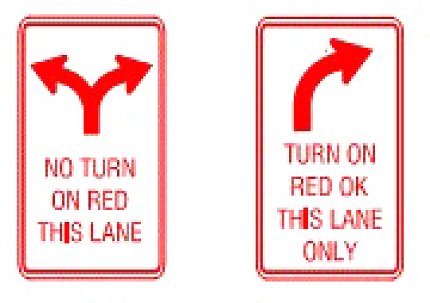Have a question about some aspect of working at NIH? Use our feedback form to post an anonymous query, and we'll try to provide an answer.

Feedback:
Response from the Office of Research Facilities
After a request from NIH, the Maryland State Highway Administration reviewed the history of the Center Dr. traffic control design and determined that the intent of the “No Right on Red” sign for Center Dr. onto Old Georgetown Rd. northbound was to only restrict vehicles from turning right from the left lane. They are proposing to replace the current signage with the following two signs, which apply to the corresponding right and left exiting lanes on Center Dr.
Feedback:
Response from ORF
Thank you for your question. It should be noted, based on your comments, you are actually referencing the F-wing in Bldg. 10, not the E-wing. A thorough walk-through was indeed conducted and every item raised in this inquiry was noted by quality assurance staff and added to punch lists of follow-up work, prior to receipt of these questions. Each item has been tracked through what the F-wing team calls pre-final inspections and final inspections. These lists are forwarded to the contractor for completion in compliance with all design and specification requirements of the overall construction contract. All final inspections have not yet occurred.
In reality, with a project of this size and complexity, there is a small chance that minor issues may go overlooked. In a major, highly technical project, the focus goes from the larger systems down to the smaller items that may have little or no impact on the ability of the facility to be used for its intended purpose. One can expect that NIH will be working on issues for up to a year after “substantial completion.” Warranty and correction work for latent deficiencies can go on for quite some time after occupancy.
However, the Office of Research Facilities has provided responses on the specific issues mentioned.
- Door systems: The F-wing team, the NIH ORF Clinical Center facility maintenance door team and a contractor have been in a prolonged process of getting the doors to operate properly. They have been testing and checking door sets, their sensors, their operators and the overall operation. They have also identified some faulty door sets. While this repair work continues, some door leaf sets are left set to “open.” Warranty work has to be scheduled in accordance with shutdowns to building systems, vendor schedules and arrival of required materials.
As an example, in late September, ORF had a shutdown of the fire protection system and the elevator call to floor 4 to test a remedy on a set of automatic doors. The result corrected the door swings. This technique will be applied to 14 other sets of doors. This will take, at minimum, 7 weekends as ORF can only correct, at most, 2 sets of doors per weekend due to shutdown requirements and the required work.
Daily damage also happens by careless vendors and jobbers. Even NIH staff crash into the doors with their carts. The automatic door controls are being adjusted regularly. Their systems are complicated and there are many of them. The contractor on site went through the building testing and documenting door systems the week of Sept. 9. Warranty work is ongoing and new work is in the final stages of inspection, acceptance and quality control to activate the last few areas. - Floor identifier signage in the elevator lobby: The signage in question was found to be incorrect and was documented on the punch list prior to receiving this inquiry. On Sept. 9, a paper correction sign was placed over the signage until a new sign, ordered that day, arrived and could be installed. Apparently someone removed the paper sign. A new paper sign was mounted until the correct sign was received and scheduled to be installed on Oct. 6.
- The sconce-type lighting fixtures: The sconces erroneously installed facing up on the 9th floor were identified on the punch lists by the quality assurance team and will be corrected. The electrical contractor has been notified and has scheduled a return visit and will take care of a number of electrical issues, including this one. The electrical contractor is no longer on the job every day and has to be scheduled to come in to correct items. Other lights found in that orientation were corrected as of Sept. 9.
Some of the lights above some boards are hand-adjusted, easy to reach and frequently someone will have a little fun and redirect their aim. Originally, there was to be important information installed on each floor on those illuminated boards. That directive was removed from the F-wing elevator lobby scope. ORF is investigating a way to have those lights only turned on when there is something to display.
The F-wing team welcomes any and all comments and is happy to respond and make corrections as necessary. They are proud of their work, never feeling like they are finished providing a higher level of quality.
